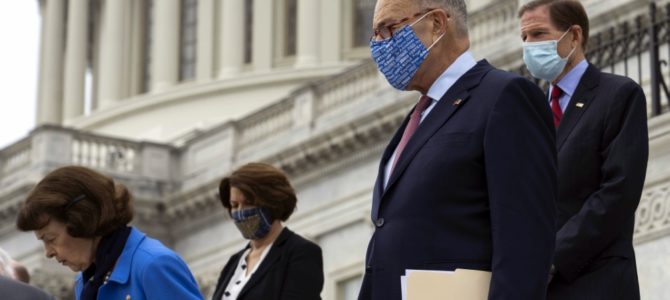
Senate Democrats continue to chip away at the Senate’s rules in an effort to jam through as much of President Joe Biden’s agenda as possible. In February, Democrats passed a $1.9 trillion spending bill using the process of budget reconciliation — a fast track procedure that cannot be filibustered. Now, based on a recent opinion issued by the Senate’s parliamentarian, Senate Democrats may have the opportunity to do it again, and again, and again.
Rather than upending the legislative filibuster, an open-ended, unlimited reconciliation process simply bypasses the filibuster altogether. And, though still subject to strict budget parameters, such a move could still allow Senate Democrats to make dramatic changes to federal law — without the input that would normally be required from Senate Republicans.
Each fiscal year, Congress is required to pass a budget that sets an overall cap on how much discretionary spending Congress can pass that year. The budget can contain “reconciliation instructions,” which direct selected congressional committees to make changes to current law to either reduce or increase spending or revenues. That reconciliation package is later passed as its own bill via a privileged process which limits debate and thus prohibits filibuster efforts. Because it is a vehicle that cannot be filibustered, 60 votes are not necessary. It simply passes at a majority threshold.
Under the Congressional Budget Act, a single budget resolution can produce up to three reconciliation bills: one addressing spending, another revenue, and finally, another addressing the debt limit. The substance of each bill must stay within the strict parameters of the CBA — for example, the provisions are required to be largely budgetary, and they cannot increase deficit impacts beyond the 10-year budget window, among other criteria.
This is in part by design. Because reconciliation is privileged — that is, not subject to the filibuster or other hurdles senators can use to delay or modify the process of passage in the Senate — former Sen. Robert Byrd, D-W.Va., the author of most of the restrictions on reconciliation (now referred to as the Byrd Rule), wanted to prevent abuse of the reconciliation process for non-budgetary items.
Yet Senate Democrats have made clear their intent to erode as many boundaries around the reconciliation process as possible. Unfortunately, it appears they have successfully cleared the first hurdle in doing so, convincing the Senate’s parliamentarian that they can tee up an entirely new reconciliation process — even several — in the same fiscal year.
Under the existing interpretation, Senate Democrats would likely face long odds in their ability to take up a substantive second reconciliation package during this fiscal year, as their first $1.9 trillion package affected both spending and revenues. While current law allows the existing budget to be amended and again reconciled, prior Senate precedent suggests those reconciliation bills have been very narrowly tailored.
In 1977, the only time the House and Senate agreed to a third budget resolution in one fiscal year, it was done solely to accommodate a sudden reversal by the Carter administration on an income tax rebate portion of a proposed stimulus bill. In speaking before the House Rules Committee in April of 1977, then-House Budget Committee Chairman Robert Giaimo, D-Conn. spoke to the narrowness of the reconciliation bill:
We do not want to make anything else in order and I cannot stress it strongly enough, because we do not want to reopen the entire budget for fiscal year 1977. We do not think that would be wise.
Senators were less polite. Sen. Henry Bellmon, R-Okla., told Carter White House officials that the contents of the third budget resolution left the budget process “with egg on its face.” Chairman of the Senate Budget Committee Sen. Edmund Muskie, D-Maine, called the move “a body blow to the congressional budget process.”
Muskie later made clear that while he grudgingly agreed for the need to accommodate Carter’s policy change, the revised budget resolution was not the type of action that should be routine. As the Senate began debate, Muskie noted:
The Budget Committee is reporting this third budget resolution now because of the serious economic conditions facing the country … But the committee wishes to emphasize that additional resolutions should be the exception and not the rule.
Reconciliation on Repeat
Wise or not, it appears Senate Democrats may have the opportunity to reopen the entire budget for fiscal year 2021 as many times as they want — overturning Muskie’s calculus, and making additional resolutions the rule, rather than the exception.
The Senate’s parliamentarian has reportedly agreed to arguments that would allow Senate Democrats to amend their budget as many times as they feel compelled within the fiscal year, and to follow those revisions with new reconciliation bills that bypass the filibuster.
What sounds like a relatively minor change to the Senate’s obscure operating procedures could, in practice, prove quite dramatic. Reconciliation bills have been used to pass massively consequential legislation in the past, including the creation of COBRA, which lets ex-employees stay on their previous employer’s health plan, the 1996 welfare reform which replaced cash payments with block grants to states, creation of the State Children’s Health Plan, and the passage of the Bush tax cuts of 2001. In 2010, reconciliation was used to implement the second half of Obamacare in a bill that also nationalized the student loan industry.
While the Senate was previously limited to using reconciliation only once every fiscal year, the parliamentarian’s opinion appears to give Democrats as many bites at the apple as they want. Democrats are still restricted by the parameters of the Byrd Rule, but only to the extent that those restrictions cannot be creatively subverted.
For example, the $15 minimum wage that was unable to be processed in the February reconciliation vehicle could be turned into tax penalties for those businesses who fail to comply — as Sen. Ron Wyden, D-Ore., and Sen. Bernie Sanders, I-Vt., have already proposed. Likely, Democrats would also seek to pass parts of Biden’s proposed $2 trillion infrastructure bill, as well as advancing benefits, and perhaps status changes for illegal immigrants as well.
While at first glance, such provisions may not appear to comply with provisions of the Byrd Rule, the parameters, like many things in the Senate, are subject to interpretation. Just as Senate Democrats convinced the Senate’s parliamentarian that repeated, entirely new reconciliation bills were unlimited in number within a fiscal year, Senate Democrats will no doubt push the parliamentarian to agree to expanded interpretations of the Byrd Rule which encompass their priorities.
Opportunities for Republicans
A reconciliation-on-repeat legislative strategy for Democrats may present Republicans with few innovative ways to pass their agenda while eroding the Senate’s rules in the process. Yet it also presents opportunities for Republicans. With each budget resolution — and again with each reconciliation process — comes an opportunity that the Senate has rarely seen in the last decade: an open amendment process.
“Vote-a-rama,” as the process is known, allows senators to offer unlimited amendments while getting every senator on the record on controversial issues in the process. Prior Senate leaders have been so unwilling to avoid placing vulnerable senators on the record that they have skipped the budget process altogether. But if Democrats are going to morph the Senate into a reconciliation machine, Republicans should avail themselves of every opportunity to force in-cycle Democrats to vote on every significant issue under the sun — and drag the process on for hours, or even days.
While still occasionally referred to as “the world’s greatest deliberative body,” the U.S. Senate is a shadow of its former self. Each party that takes power uses its position to slowly undo the rules, customs, and traditions that have made the Senate a legislative body distinct in its deliberative nature, and unique in the empowered minority rights designed to require consensus, rather than strict majoritarian rule. The slow erosion of the budget process to serve partisan ends is merely another brick in the wall forming the Senate’s tomb.
But, as Democrats learned when former Majority Leader Harry Reid, D-Nev., began undoing the filibuster on judicial and cabinet nominations, what serves one party in the short term invariably turns on them in one or two election cycles. Democrats may achieve a significant amount of policy gains by engorging the reconciliation process, but they should prepare to be bludgeoned with the tool of their own making when the tables once again turn.









